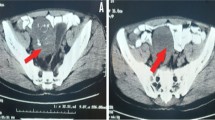Abstract
The persistent Müllerian duct syndrome is characterized by the retention of Müllerian derivatives in patients otherwise normally virilized. Clinically, the persistence of uterus and tubes leads either to cryptorchidism or inguinal hernia, depending on whether or not the Müllerian derivatives can be mobilized during testicular descent. The condition is usually discovered at surgery, however preoperative sonography could allow the diagnosis to be made preoperatively. The molecular basis of the persistent Müllerian duct syndrome is heterogeneous, and is reflected by wide variations in the serum concentration of anti-Müllerian hormone. Some cases are apparently due to end-organ resistance, and are associated with normal serum levels of the hormone. Others, characterized by absent or low hormone concentrations, can be explained by mutations of the gene coding for anti-Müllerian hormone, which are distributed along the whole length of the coding region.
Similar content being viewed by others
Abbreviations
- AMH :
-
anti-Müllerian hormone
- PMDS :
-
persistent Müllerian duct syndrome
References
(deleted)
Cohen-Haguenauer O, Picard JY, Mattei MG, Serero S, Nguyen VC, de Tand MF, Guerrier D, Hors-Cayla MC, Josso N, Frézal J (1987) Mapping of the gene for anti-Müllerian hormone to the short arm of human chromosome 19. Cytogenet Cell Genet 44:2–6
Guerrier D, Tran D, VanderWinden JM, Hideux S, Van Qutryve L, Legeai L, Bouchard M, van Vliet G, DeLaet MH, Picard JY, Kahn A, Josso N (1989) The persistent Müllerian duct syndrome: a molecular approach. J Clin Endocrinol Metab 68:46–52
Imbeaud S, Carré-Eusèbe D, Boussin L, Knebelmann B, Guerrier D, Josso N, Picard JY (1991) Biologie moléculaire de l'hormone anti-Müllérienne normale et pathologique. Ann Endocrinol 52:415–419
Josso N, Legeai L, Forest MG, Chaussain JL, Brauner R (1990) An enzyme-linked immunoassay for anti-Müllerian hormone: a new tool for the evaluation of testicular function in infants and children. J Clin Endocrinol Metab 70:23–27
Josso N, Boussin L, Knebelmann B, Nihoul-Fékété, C, Picard JY (1991) Anti-Müllerian hormone and intersex states. Trends Endocrinol Metab 2:227–233
Josso N, Cate RL, Picard JY, Vigier B, Pepinsky RB, di Clemente N, Wilson C, Imbeaud S, Guerrier D, Boussin L, Legeai L, Carré-Eusèbe D (1993) Anti-Müllerian hormone, the Jost factor. Rec Progr Horm Res 48:1–59
Jost A (1953) Problems of fetal endocrinology: the gonadal and hypophyseal hormones. Rec Progr Horm Res 8:379–418
Knebelmann B, Boussin L, Guerrier D, Legeai L, Kahn A, Josso N, Picard JY (1991) Anti-Müllerian hormone Bruxelles: a nonsense mutation associated with the persistent Müllerian duct syndrome. Proc Natl Acad Sci USA 88:3767–3771
Naguib KK, Teebi AS, Al-Awadi SA, El-Khalifa MY, Mahfouz ES (1989) Familial uterine hernia syndrome: report of an Arab family with four affected males. Am J Hum Genet 33:180–181
Picon R (1969) Action du testicule foetal sur le développement in vitro des canaux de Müller chez le rat. Arch Anat Microsc Morphol Exp 58:1–19
Sloan WR, Walsh PC (1976) Familial persistent müllerian duct syndrome. J Urol 115:459–461
Author information
Authors and Affiliations
Rights and permissions
About this article
Cite this article
Josso, N., Picard, J.Y., Imbeaud, S. et al. The persistent Müllerian duct syndrome: A rare cause of cryptorchidism. Eur J Pediatr 152 (Suppl 2), S76–S78 (1993). https://doi.org/10.1007/BF02125444
Issue Date:
DOI: https://doi.org/10.1007/BF02125444




